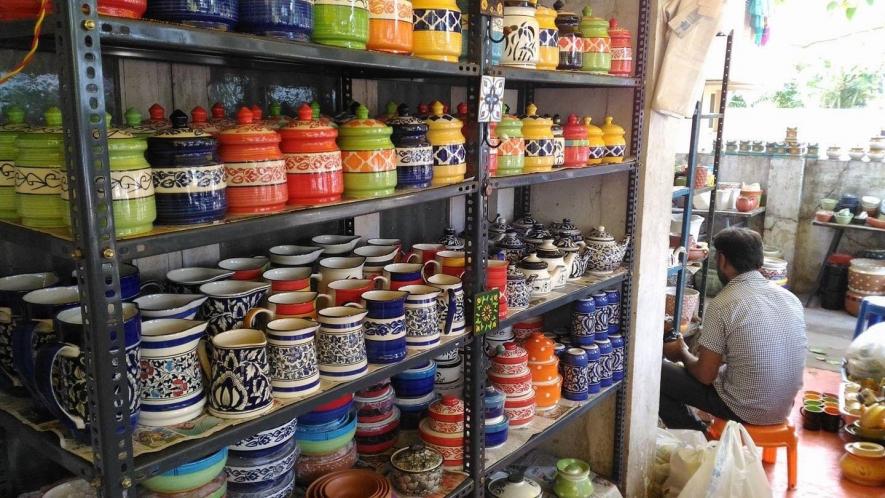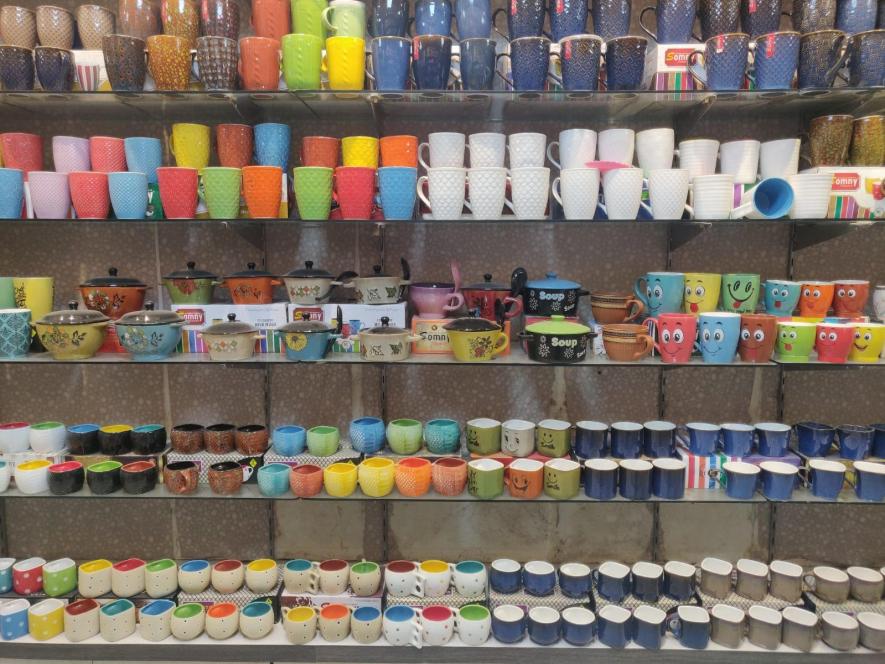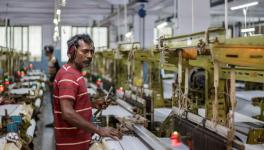UP: Khurja's Ceramic Industry Becomes Museum of Lost Art Amid Lockdown

The multiple extensions of COVID lockdown has left traders and businessmen with no money, no workers, and very little hope for a better future.
Lucknow: Zaheeruddin has been creating art ever since he can remember in Khurja - an urban hamlet in Bulandshahr district also known as the 'ceramic city'. When he shows his colourful glazed pottery, his face lights up. He narrates how an artisan shapes the bowl and paints it, but with sales of blue pottery and other ceramic crockery especially pots, vases dipping like never before, Zaheeruddin and many potters in the city fear that their colony will soon become a museum of lost art.
Khurja, potters' town in Uttar Pradesh, 150 km from national capital, which has thrived for over 500 years, is known for its rich ceramic crafts and potters of the city who continued to thrive even during demonetisation. But two months into this unprecedented health and economic crisis caused by the COVID-19 pandemic and consequent lockdown, many are being crushed under the fear of being unable to pay rent and bills due to zero deals. They are under the fear of losing their businesses and homes. The multiple extensions of COVID lockdown has left traders and businessmen with no money, no workers, and very little hope for a better future.
"It is ironical that we are facing an existential crisis at a time when the BJP led government is promoting artisans and manufacturers under One District One Product (ODOP) scheme. The government talks of promoting ceramic, but it seems like nothing more than lip service,” Zaheeruddin, who has won the prestigious Shilp Guru award by Ministry of Textile, told NewsClick.
He said that the raw material in stock at their homes finished first, then the orders dried up and now, with no idea of when markets will open fully or who will buy their wares, Khurja’s artisans are counting each rupee and scrambling to feed their families.
The city's pottery business employs more than 1 lakh people directly or indirectly including entrepreneurs, transport, straw-selling farmers, packaging, etc. There are currently around 200 pottery units operating in and around Khurja, which supply a considerable portion of the ceramic cutlery for both domestic consumption and to export abroad. "A large number of migrant labourers who went to celebrate Holi haven't returned. The rest of the workers left Khurja after the first phase of lockdown. Although orders have been given by the government to start the pottery industry on May 3, but due to lack of availability of transport, labour, packaging, raw material etc., the wheel of the pottery industry could not start spinning,” Zaheeruddin said.
The decline in demand has sharply decreased job opportunities. Huraira, an artisan whose family has been involved in making blue pottery since five generations, sees no hope that his family would take up the hereditary profession. “I cannot ask my children to join a profession that barely keeps me employed for the most part of the year. This is likely to die with me as nobody has taken up this art in my family,” he said, adding with a heavy heart that the lockdown has taken the sheen off blue pottery.

KHURJA - A POTTER'S PARADISE NO MORE
The baked clay pottery is said to have come to India with Afghan king Taimur Lung as he passed through Khurja along with potters from Egypt and Syria during an easterly campaign over 500 years ago. The potters have had several occasions to show their art during annual exhibitions by Delhi Blue Pottery Trust (DBPT) or any Ceramics Fest in country. But, first demonetisation and the latest two months long lockdown has forced them to think to opt for other business opportunities. Many of them claimed that Khurja, considered a paradise of potters, is no more.
At every nook and corner in Khurja, one can find a workshop or a factory with an attached shop of this town but ever since lockdown was imposed, the clinking sound of ceramics and the puffing of chimneys have fallen silent.
LK Sharma, scientist in charge of Central Glass and Ceramic Research Institute (CGCRI) said that the industry has suffered a huge blow due to the exodus of migrant labourers, with 60% of them already off to their home states during the first phase of lockdown. “Later, when the government began running train and buses services in Uttar Pradesh again, the rest 10 to 15% left for their home states. Most of the artisans involved in blue pottery are from West Bengal," he said.
"There are 404 Micro, Small and Medium Enterprises (MSME) in Khurja and 25,000 organised and unorganised workers associated with this sectors. Khurja's blue pottery industry generates Rs 400 to 500 crore per month and in two months of lockdown, we have incurred losses to the tune of Rs 800 crore to Rs 1,000 crore," he added saying that artisan items from Khurja may not have market demands till December. Till then all those involved in this business will be under severe distress.
He further added, "'Blue pottery is a luxury lifestyle product and it is very costly. Due to economic crisis amid lockdown, people may not expend money on such products but rather choose to spend money on essential commodities."
Explaining how the blue pottery industry suffered due to skilled workers exodus, Sharma said, "While a huge chunk of the labourers have left for their home states, those who stayed back are only getting 50% salary."
Nikhil Poddar, secretary of Khurja Pottery Manufacturers’ Association said ceramic industry has been witnessing a daily loss of Rs 5 crore. "We have trained labourers and they are mostly from West Bengal, Bihar and Eastern Uttar Pradesh, most of them have gone to their respective homes. Until the whole market opens, we cannot overcome the loss as our products are known as luxury items. We are fully dependent on opening of markets so that exhibition can take place."
"We are a small scale industry and when our products won't sell, flow of money would be stopped and we can’t work without payment. So the business is closed ever since lockdown wasimposed but government's fix on our expenses has remained same. Fixed charges of electricity, bank loans, etc., need to be paid at any cost as there is no relaxation," he added, saying that both central and state government should promote ceramic artistic items and ceramic tableware and invite exporter and corporate sector so that this industry can keep their hope alive.
Pointing out the adverse impact of Goods and Services Tax (GST), Poddar said, "The GST, ranging from 12% on wool to 18% on handmade ceramics, has dented our sales and made handmade products expensive.” He added hat a single product takes almost two weeks which increases the labour cost exponentially. “The additional 12% GST also takes a hit on our sales,” he said.
Get the latest reports & analysis with people's perspective on Protests, movements & deep analytical videos, discussions of the current affairs in your Telegram app. Subscribe to NewsClick's Telegram channel & get Real-Time updates on stories, as they get published on our website.
























